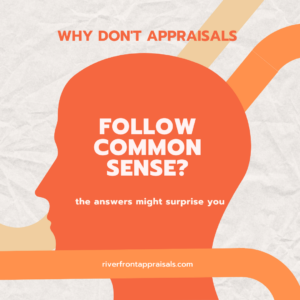
Property Taxes Just Went Up? We’ve Got You Covered!
It’s reassessment season for most folks in our area. Homeowners

Promoting Public Trust Part 1: What is USPAP?
This is part one of a 12-part blog and podcast series on the appraiser’s professional standards of practice, called USPAP. If you prefer consuming information by listening to a podcast, this topic will be dropping on The Appraisal Cast very soon! Keep a lookout!
Let’s start with the acronym USPAP. USPAP stands for Uniform Standards of Professional Appraisal Practice. It’s our code of ethics. Our list of rules and regulations. It’s similar to the Code of Medical Ethics for doctors from the American Medical Association, or the Realtor’s Code of Ethics from the National Association of Realtors.
Quoting from USPAP, the purpose of this set of standards is “to promote and maintain a high level of public trust in appraisal practice by establishing requirements for appraisers.” All appraisers have to take a USPAP update class every two years to be reminded of what our standards are, and also to learn of any changes made in the prior two years. When I took the update class in 2020, I got to thinking about that phrase to promote and maintain a high level of public trust. And I just began wondering…does the public trust us? If so, is it because of USPAP? Or does the public not trust us; and if not, why not? We have this enormous document that was created for the promotion and maintenance of the public’s trust in us. Is it working?
Thus this series was born.
In this series, we’ll be covering all kinds of topics that affect the public – homeowners, lenders, Realtors, you name it. We’ll be looking at topics like bias, appraiser conduct, highest & best use, competency, fair housing, confidentiality, and more.
But today, we’re just going to ease into it with some basic information about USPAP and how it can – if it doesn’t already – help to promote and maintain a high level of public trust in the appraisal practice.
Let me just insert one point of clarification here though, before going on. It is not USPAP that promotes and maintains trust. It is the appraiser being in compliance with USPAP who promotes and maintains public trust. A document cannot do this. Only an individual who is an appraiser and who follows these standards can help the general public and users of appraisals trust our profession, and the appraisals we complete.
In USPAP, the question is actually asked, “What is public trust and who or what is the public in the USPAP context?”
[bctt tweet=”It is the appraiser being in compliance with USPAP who promotes and maintains public trust. A document cannot do this. Only an individual who is an appraiser and who follows these standards can help the general public and users of appraisals trust our profession, and the appraisals we complete.” username=”RiverfrontApp”]
I’m going to read the answer straight from USPAP, but I’ll insert my own comments as we go along. USPAP says that “While USPAP does not define public trust, it is clear from the context that it refers to the need for the public to be able to have confidence that services provided by an appraiser are performed competently and in a manner that is independent, impartial, and objective.”
Interesting language, wouldn’t you agree? So the public has a need to be able to have confidence that what we do as appraisers, the services that we provide, is done competently and unbiased – two things we’ll discuss in future posts. Just as we need to be able to trust that our doctor is competent to diagnose whatever is ailing us, and can provide treatment that is helpful, the public needs to be able to trust appraisers with the valuation of what is likely their largest investment.
Now who is ‘the public’?
Again, quoting USPAP, “The public, whose trust the appraiser must promote and preserve, exists on several levels. The most direct is the appraiser’s client. In addition to the client, any additional intended users would be part of the appraiser’s public. But, even beyond the client and other intended users, there are other parties who may rely on the work of an appraiser and the appraiser must be careful not to mislead such third parties. Finally, it could be said that the general public is also part of that public. If the general public cannot depend on appraisers to act as independent professionals and provide credible results, the economy could suffer.”
So the public consists of the appraiser’s client (usually a bank if we’re talking about residential appraisals), any additional folks who may read and rely on the appraisal (FHA for example would be someone in addition to the bank), and then just you & me. The general public.
Did you catch that last sentence in the paragraph above? “If the general public cannot depend on appraisers to act as independent professionals and provide credible results, the economy could suffer.” That’s a strong statement. And one with which I absolutely agree. I would even take it one step further, and say that because appraisers in the past have not complied with USPAP, this has led to both a loss of the public trust in our profession, and as well – it has contributed to the economic suffering of our country. Think about it. Unethical appraisers. Incompetent appraisers. Appraisers who just ‘hit the number’. Appraisals that are too high; appraisals that are too low. None of these appraisals promote public trust. None of these appraisers work to help the economy. And for that – to the public – I apologize. You deserve more from us.
So why is USPAP such a big deal to appraisers, and why should it be a big deal to you? Listen to the language here. These are not merely suggestions or ideas. They are imperatives. Non-negotiables if you call yourself an appraiser, and absolute must-haves if you’re hiring an appraiser:
Quoting from various lines in USPAP:
“It is essential that appraisers develop and communicate their analyses, opinions, and conclusions to intended users of their services in a manner that is meaningful and not misleading.”
“The appraiser’s responsibility is to protect the overall public trust.”
“An individual who agrees to perform a valuation service as an appraiser has a duty to comply with the ethics and competency that the public expects from an appraiser.”
Public trust is important. In today’s changing world and challenging real estate landscape, perhaps it’s more important than ever. By adhering to the standards set forth in USPAP, appraisers can provide meaningful services that protect, promote, maintain, and even increase the public trust. In the next several posts, we’ll examine the specific ways appraisers can do just that. Stay tuned!
Helping homeowners navigate the appraisal process,
Ryan Bays, SRA, AI-RRS

It’s reassessment season for most folks in our area. Homeowners

I feel like we all need a laugh. How about

So this may be a slight break from the norm,
Riverfront Appraisals has been providing comprehensive valuations of residential properties to Western Kentucky and Southwestern Indiana since 2008.